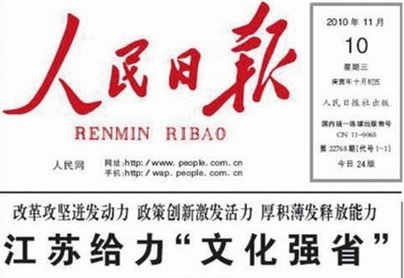| 
The Chinese cyber buzzword "geili" literally means "to give power" but is now widely accepted as an adjective describing something that's "cool," "awesome" or "exciting."
“給力”是當(dāng)前在中國極為流行的網(wǎng)絡(luò)熱詞,它的字面意思是“給予力量”,但是現(xiàn)在被廣泛用做形容詞,描述某事物很“酷”、“牛”、“帶勁兒”。
But it was the word's antonym, "bugeili" -- meaning dull or boring -- that first grabbed public attention after it appeared online in a May episode of a Japanese comic animation.
然而,最早在網(wǎng)絡(luò)上流行起來的卻是“給力”的反義詞。今年五月,在網(wǎng)上流傳的一集日本搞笑動畫片的中文配音中,出現(xiàn)了“不給力”的說法,意思是“乏味”、“無聊”。
The word has since evolved the English-sounding forms "gelivable," and "ungelivable," and the French "très guélile."
后來,“給力”一詞逐漸演化,發(fā)展出按照漢語音譯的英文版本“gelivable”、“ungelivable”(否定形式),還有法文版“très guélile”。
On November 10, "Geili" featured in a headline on the front page of the People's Daily. While it had the different meaning "to empower," readers were surprised and delighted to see it used by the usually conservative Party newspaper.
2010年11月10日,“給力”一詞出現(xiàn)在當(dāng)天《人民日報》頭版頭條的標題中。報紙上的“給力”與之前在網(wǎng)絡(luò)流行的含義有所不同,是“給予力量”、“加油”的意思。盡管如此,一個網(wǎng)絡(luò)熱詞竟然登上了相對比較保守的黨報,這件事還是讓千百萬網(wǎng)民們又驚又喜。
(China.org.cn Rebecca 譯) |

